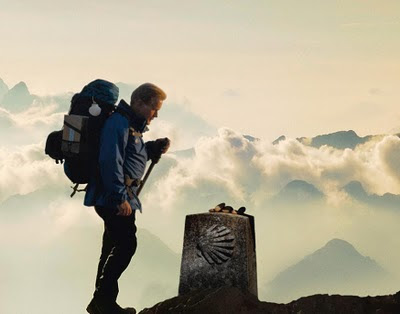Cast: Martin Sheen, Emilio Estevez, James Nesbitt, Deborah Kara Unger, Yorick van Wageningen
Tom is playing golf with his Country Club buddies in California when he receives news that his estranged son Daniel has been killed in a storm in the Pyrenees. Daniel was one day into the famed ‘Camino de Santiago de Compostela’ – an epic two month pilgrimage across the mountains from France to Spain, to the supposed resting place of St James. Tom travels to France to collect the ashes; and after a tormented, sleepless night he decides to take the trip in Daniel’s place, wanting to better understand the son he never knew.
But Tom is not alone for long, for the pilgrimage is a busy route populated with the world’s devout, overweight, and nicotine addicted. Joost is a sensitive and powerful Dutchman hoping to lose enough weight to persuade his wife back into the bedroom; Sarah is a sardonic Canadian with a smoking problem and a difficult past; and Irishman Jack, despite the torrential flow of words pouring from his mouth, is suffering from a rare case of writer’s block. These troubled souls – attracted to Tom’s aching, stubborn silence – form a makeshift gaggle, and help one another on their respective journeys.
Estevez’s script never quite does justice to the indescribable beauty of the pilgrimage. For each of the lonely souls that trudges through these mountains, the journey is an ethereal challenge: mundane and desperate, yet brilliant and life changing. But Estevez imposes a traditional narrative of highs and lows that will be enjoyed by even the most hardened of Hollywood hacks. This is supposed to be an adventure of discovery; but the route is all too familiar, the destination all too obvious.
The script is overly wordy, filled with twee clichés and simple emotional responses for actor and audience alike – do “sad”, do “elated”, do “flustered”. Long sequences that could have been beautifully rendered in silence are filled with the blabbering dialogue of a filmmaker too scared to film quietness in all its untameable beauty. Similarly, Estevez uses crass ghostly hallucinations to evoke the painful feelings of loss and guilt from which Tom is suffering; and every time ‘ghost Daniel’ appears on screen you can almost hear the frowns of those viewers hoping for a touch of subtlety.
But somehow, despite the simple and sometimes obtuse storytelling, there is something strangely intimate and mesmerising about this film. Estevez and his father, Martin Sheen, have a clear artistic chemistry, and a rare level of honesty that translates beautifully onto the screen. Sheen is excellent as Tom: he is fragile and confused, but still ruddy and headstrong. His explanation, to his doctor, that he is “going overseas to bring Daniel home” is a peculiarly American, almost military reaction to grief. We watch the walls of his California Country Club life come crashing down around him, and we know he is scared, exhilarated, and somehow relieved by it all.
Another reason for the mesmerising beauty of the film is the physical location of the pilgrimage. This long, meandering path has been etched into the ridges and fields of the Pyrenees for hundreds of years, and it doesn’t require a religious sensibility to feel overawed by the calm, gentle power of the area. It is not a beauty on the scale of the canyons of Utah or the mountains of Montana, but it is an unassuming beauty that lends the film a sense of eternal hopefulness.






No comments :
Post a Comment